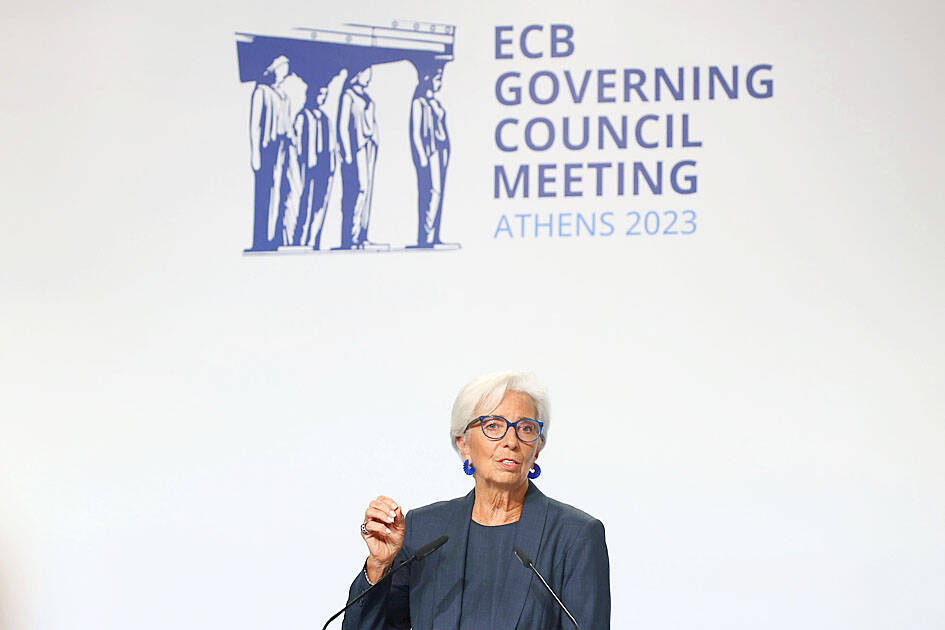The European Central Bank (ECB) left interest rates unchanged for the first time in more than a year as it gauges whether an unprecedented series of hikes will succeed in subduing inflation.
Following last month’s knife-edge decision to lift the deposit rate to a record 4 percent, policymakers kept it there yesterday — matching the predictions of all economists surveyed by Bloomberg.
They reiterated in a statement that holding borrowing costs at that level for long enough will make a “substantial contribution” to bringing consumer price gains back to the 2 percent target.

Photo: Bloomberg
Speaking in Athens, where the Governing Council gathered for one of its regular meetings beyond the ECB’s Frankfurt headquarters, President Christine Lagarde said “we have to be steady.”
“Having a discussion on cuts is totally, totally premature,” she told reporters, reiterating her position from last month’s meeting. “The fact that we are holding doesn’t mean to say that we will never hike again.”
The euro held losses against the US dollar, while German bonds edged higher. Italian bonds, which have been a major beneficiary of ECB debt-buying programs, outperformed as Lagarde said changes to the 1.7 trillion euro (US$1.8 trillion) pandemic-era Public Sector Purchase Program (PEPP) initiative weren’t discussed this week.
Like its peers in the US and the UK, the ECB hasn’t shut the door to further hikes, should inflation fail to ease quickly enough. But there is little doubt among economists and investors that the high point for eurozone borrowing costs has been reached following 10 back-to-back moves starting in July last year.
ECB officials aren’t offering many clues, with several focusing instead on other policy levers like PEPP. Tweaks there could prove controversial, though, as Middle East tensions threaten to push oil prices higher, Italy’s government finances worry investors and the euro area’s economy wobbles amid higher credit costs.
“As is often the case with monetary policy, there is this transmission lifetime,” Lagarde said. “The assessment by our staff is that there is still more in the pipeline, and more to come to affect the real economy. And the assumption is that it will continue to unfold throughout the end of 2023 and first quarter of 2024.”
The ECB’s announcement is part of a slew of global rate meetings. On Wednesday, the Bank of Canada kept rates unchanged for a second straight time, while leaving open the possibility of more tightening. Next week will feature decisions by the US Federal Reserve and the Bank of England. Both are expected to hold fire.
Lagarde warned that growth risks remain skewed to the downside.
“The economy is likely to remain weak for the rest of this year,” she said. “But as inflation falls, further household real incomes recover and the demand for euro-area exports picks up, the economy should strengthen over the coming years.”

Vincent Wei led fellow Singaporean farmers around an empty Malaysian plot, laying out plans for a greenhouse and rows of leafy vegetables. What he pitched was not just space for crops, but a lifeline for growers struggling to make ends meet in a city-state with high prices and little vacant land. The future agriculture hub is part of a joint special economic zone launched last year by the two neighbors, expected to cost US$123 million and produce 10,000 tonnes of fresh produce annually. It is attracting Singaporean farmers with promises of cheaper land, labor and energy just over the border.

US actor Matthew McConaughey has filed recordings of his image and voice with US patent authorities to protect them from unauthorized usage by artificial intelligence (AI) platforms, a representative said earlier this week. Several video clips and audio recordings were registered by the commercial arm of the Just Keep Livin’ Foundation, a non-profit created by the Oscar-winning actor and his wife, Camila, according to the US Patent and Trademark Office database. Many artists are increasingly concerned about the uncontrolled use of their image via generative AI since the rollout of ChatGPT and other AI-powered tools. Several US states have adopted

A proposed billionaires’ tax in California has ignited a political uproar in Silicon Valley, with tech titans threatening to leave the state while California Governor Gavin Newsom of the Democratic Party maneuvers to defeat a levy that he fears would lead to an exodus of wealth. A technology mecca, California has more billionaires than any other US state — a few hundred, by some estimates. About half its personal income tax revenue, a financial backbone in the nearly US$350 billion budget, comes from the top 1 percent of earners. A large healthcare union is attempting to place a proposal before

KEEPING UP: The acquisition of a cleanroom in Taiwan would enable Micron to increase production in a market where demand continues to outpace supply, a Micron official said Micron Technology Inc has signed a letter of intent to buy a fabrication site in Taiwan from Powerchip Semiconductor Manufacturing Corp (力積電) for US$1.8 billion to expand its production of memory chips. Micron would take control of the P5 site in Miaoli County’s Tongluo Township (銅鑼) and plans to ramp up DRAM production in phases after the transaction closes in the second quarter, the company said in a statement on Saturday. The acquisition includes an existing 12 inch fab cleanroom of 27,871m2 and would further position Micron to address growing global demand for memory solutions, the company said. Micron expects the transaction to